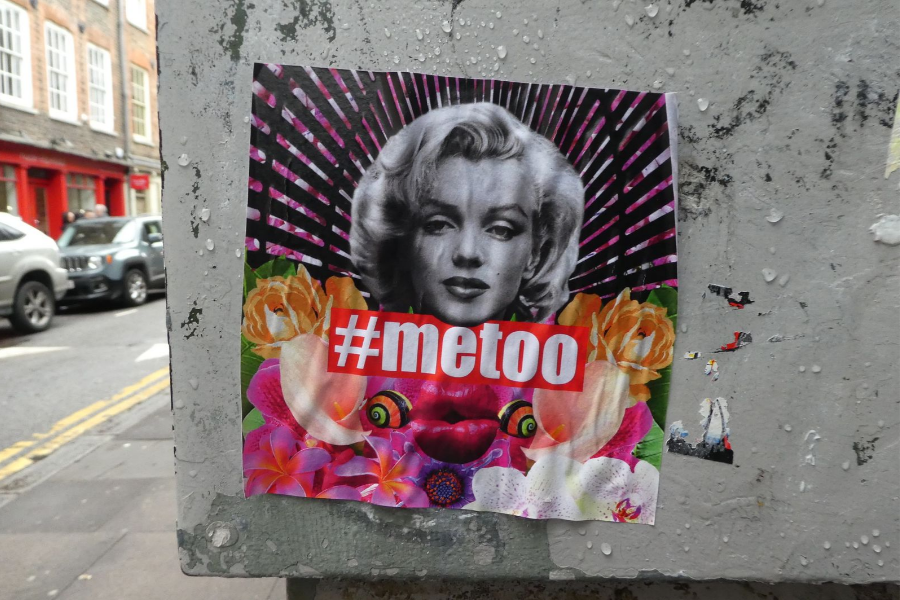A month after the first revelations of Sofia Bekatorou about her rape, when she was 22 years old, by the now former vice-president of the Hellenic Sailing Federation, Aristides Adamopoulos, the Greek #metoo is a fact.
The public sphere has been flooded with dozens of named testimonies of women mainly from the fields of sports and theater, but also collective complaints from students from university schools such as the Aristotle University of Thessaloniki, the School of Fine Arts, and the School of Theater Studies in Nafplion.
The survivors report their traumatic experiences wherever they are given the space to do so: on social media, in the mainstream media, in their union bodies (such as the Greek Actors’ Union or the Dancers’ Union), some make complaints to the Authorities.
Common denominator
The common denominator in all incidents is the exercise of gender and sexual violence/harassment/violation by some toxic masculinity, on women, femininities, or LGBTI+ people.
The perpetrators not only abused/harassed in the context of the work/educational/sports environment but at the same time taking advantage of their higher hierarchical position, abusing their authority and male privilege, extorting the silence of their victims, with threats of dismissal and adverse treatment.
The testimonies of the survivors are indicative and outline the gloomy climate of violence, humiliation, hostility, and restriction they faced and the serious and long-term psychological and social consequences caused by sexual violence and harassment in their lives.
The Pervasive culture of sexism
The number of testimonies and the fact that the complaints came from famous and recognized female athletes, actors, and journalists and they referred to well-known factors in sports and the field of art, caused a well-known “shock” in Greek society; a society that for decades not only closed its eyes on research data (1 in 2 women in the EU have experienced sexual harassment at least once in their life since the age of 15), but turned a deaf ear to the corresponding traumatic experiences of thousands of women, who may have been their relatives, friends, colleagues, or neighbors.
After all, the pervasive culture of sexism and rape was not missing in the case of the Greek metoo: The first announcement by the Hellenic Sailing Federation whitewashed the perpetrator, without a trace of compassion and support for the victim; the pressing question “why now?”; the copious amount of television time initially given to the perpetrators to explain that we misunderstood something or that they loved the victim; the exhortations to survivors not to come forward publicly if they were unwilling to go to justice or if the offenses were time-barred; the discrediting of some forms of gender-based violence that were considered “light” compared to other “serious” ones; even the victim blaming of survivors who were not “to our liking” while the perpetrator was – showed how normalized gender-based violence is in Greek society, how social tolerance in abuse and institutional inadequacies crush and silence victims but create a sense of omnipotence in perpetrators.
They weren’t “monsters”
Perpetrators that the dominant discourse could no longer present as “monsters”, “diseased minds”, “mentally ill”, “abnormal, or “foreigners”, trying to convince us that these are “isolated incidents”, “exceptional cases” that escape from the rule “we don’t even hit women with a rose”, – a very frequent practice that aims to alleviate the collective fantasy and to relieve the state and society of any responsibility it has for the prevention and elimination of the phenomenon of gender-based violence.
The …fairytale with the dragon could no longer stand, as the abusers were employers, colleagues, superiors, journalists, actors and directors, and sports agents, who operated for years and repeatedly unmolested and unpunished, within male-dominated systems with strict gender hierarchies, where the law of silence and complicity was the regime.
Brave women
Survivors are women who publicly shared painful experiences of abuse and violation, and showed an act of courage that is both shocking and moving. They came forward, with no guarantee that they wouldn’t be targeted (quite the opposite) and confronted their abusers – they demanded justice.
Their motivation was not only to heal their trauma but to protect the “younger”, as many mentioned, to transform their scenes, so that sexual violence in sports or abuse and mobbing with gender connotations, in the theater and elsewhere will no longer be tolerated.
These women also played a decisive role in destigmatizing the victims of rape and sexual violence, crimes – which in the context of the sexist society we live in – place shame and guilt on the victims and not on the perpetrators. By refusing to “live with their trauma” as our mothers and grandmothers were forced to do, they were instrumental in making the shame change sides this time.
Wave of support
In their sobs, tears, and broken voices, thousands of women and femininities recognized our own embodied experiences of gender oppression, our anxiety about how to manage the (individual and collective) trauma of gender violence, and our silences and cries.
An unprecedented movement of support for the victims broke out on social media, with pioneering women and femininities, who carried in their luggage images of the great feminist struggles of the last five years: from the global #metoo movement and the “Not one less” movement in Chile to the movement for the legalization of abortion in Poland and Ireland, and from the feminist strikes in Spain and Latin American countries to the large marches for feminicide and the gang rape of Eleni Topaloudi in Greece.
The role of social media
The hashtag #metoo trended for several days, while hundreds of women took the floor and spoke openly about their own experiences of abuse. For the first time blame against the victims was collectively challenged. Statements that reproduced rape culture were targeted as were their speakers.
The mobilization on social networks – even amid quarantine and restriction of movement and the exercise of the right of assembly – exerted significant pressure on institutional bodies and public figures to take a stand for mass stigmatization of gender-based violence and abuse.
This favorable climate encouraged many women who experienced or were experiencing gender-based violence to turn to agencies for information or support. It is indicative that during the period of the Greek #metoo and afterward, the calls for help to the Diotima Center doubled, as did the requests for legal help and psychosocial support.
Empowering momentum
In fact, given that the Diotima Center supports survivors belonging to excluded groups (unemployed, single parents, women with low incomes) we could guess that the Greek #metoo helped to empower non-privileged subjects, without resources and information, who are more vulnerable and trapped in abuse. The Lignadis case and the profile of his victims who denounced him to justice highlight this aspect.
We can also find seeds of the empowering dimension of the Greek #metoo in the subsequent cases of Stathis Panagiotopoulos who continued to sexually abuse his ex-partner through images and revenge porn, and also in the case of Georgia’s rape in Thessaloniki.
In these cases, despite the imbalance of power between perpetrators and victims, the latter did not hesitate to bring their abusers to the hot seat, while in the case of Georgia, the survivor spoke publicly and by name about her experience, making the inadequacy of the authorities in the management of incidents of sexual violence evident.
Delivering justice
At the same time, the pressure for justice and the vigilance of the Greek #metoo for the proper functioning of the authorities did not leave much room for the usual culture of impunity for the perpetrators, of sexual crimes in particular to prevail, as the mass rape in Amarynthos.
The perpetrators were not only faced with Justice but also with social disgrace, which also caused a significant blow to their professional activity (interruption of collaborations, withdrawal of sponsors).
Finally, the pressure on the mainstream media was also important, as they were forced to give space to the complainants, to apologize in cases where they acted as laundromats for the perpetrators (especially at the beginning of the Lignadis case), while from the Greek #metoo onwards, the exposure of issues that aim to inform and raise public awareness of issues of gender-based violence significantly increased.
This, however, does not mean that there is not much room for improvement or that the reproduction of sexist speech by the mass media has stopped.
Open questions
The question remains open as to whether the concept of toxic masculinity and entrenched attitudes and embedded gender stereotypes received a significant blow from the Greek #metoo.
However, I cannot help but note that several men in my environment have questioned whether they have also been violators or abusers, illuminating their experiences anew using other meanings and values, looking for new versions of masculinity, far from the hegemonic masculinity, according to which the men are by their “nature” aggressive and violent.
The institutional footprint
With the Greek metoo, the issue of sexual violence/harassment gained much visibility as it had never gained before. Under the weight of the revelations, a special condition was created for the introduction of new measures and provisions and the tightening of the existing ones, and the intensification of their application in practice.





